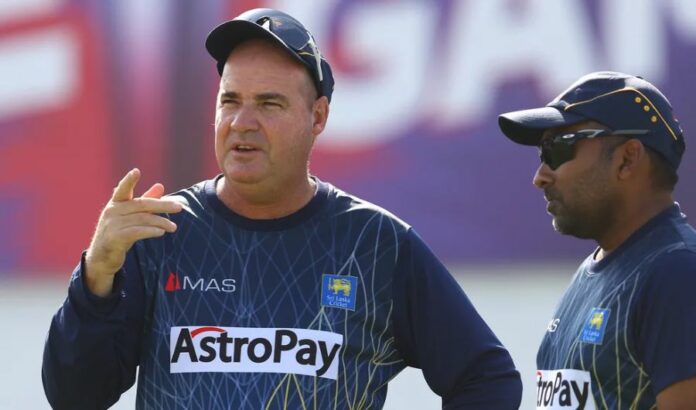There are few people better-placed to lead a Sri Lankan team through the First Round at the ICC Men’s T20 World Cup than Mickey Arthur.
Touted as a coach throughout his playing days, Arthur has always exhibited the virtues of the profession. Approachable, clear in communication, and meticulous in detail, Arthur’s emotions in the stands or in the dugout are there for everyone to see, as he lives the ups and downs of international cricket almost alongside his players.
Speaking to the ICC ahead of the Men’s T20 World Cup, a buoyant Arthur showed no sign of changing during Sri Lanka’s campaign.
“I love the passion. I love the intensity of it. I love riding that emotional wave.
“Some people say coaches should be stoney-faced and just sit there. It’s not my character. I can’t do that. I love the journey. I love the drive.”
The Sri Lankan job is Arthur’s fourth international role across a 16-year international coaching career, a span now longer than his time as a professional player. Compiling over 10,000 runs across South African domestic cricket and representing South Africa A, Arthur transitioned to coaching younger than most. Early domestic success followed, and an offer to coach South Africa was forthcoming.
Read – Surprising Sri Lanka
He experienced a baptism of fire, facing an Australian side still at the peak of their powers, though his class shone through, ending a 43-year drought with a Test series win over England, and eventually beating Australia in a Test series away from home. Arthur then became Australia’s first foreign Head Coach, before winning the 2017 ICC Champions Trophy with Pakistan. He was appointed as Sri Lankan head coach in February.
For Arthur, to meet the high expectations of the job and winning as a team, he knows it’s imperative that plans are put in place to allow players to find their own path to winning individual battles on the field.
“I think first of all you’ve got to understand it’s about the players. The environment is about the players and you’re there to create that environment for them. And then, every player is different, and you’ve got to treat every player different.”
“There’s not a one-size-fits-all here in this job and you’ve got to get in and have that connection with every one of your players in order to get the best out of them.”
While formulating game plans, acting on observations and utilising the available analysis and data to apply on the day of a match are all essential, for Arthur, one eye also needs to look at the future, to consider a cricketer’s overall growth.
“The most important thing for me though is seeing player development. Seeing young guys come into your system, seeing them develop and then seeing them be successful at international level.”
Read More – Muralidaran: Delighted to see how spinners have prospered in T20 cricket
“There’s no better feeling in the world for a coach than having had a small impact in that player’s development.”
For Arthur, it’s important to not let a match or moment define a campaign. While living the ups and downs in the throes of battle, Arthur stresses that one result does not make or break a team, and defeat brings with it lessons and intel, provided it is observed through the lens of perspective.
“Out of defeat there’s a lot of learnings. There’s always going to be one side that wins and there’s going to be one side that loses, you’ve just got to make sure that you win a little bit more often than you lose.
“But all I want to know is that the boys are learning, that they’re going in the right direction and they’re getting better and better.”
Though the wisdom found through experience extends further than just plans on the field. Acknowledging mistakes and missed opportunities throughout his career, Arthur has learned to shape his own philosophies in a way to meet team needs. Different jobs have forced Arthur to adapt. Quite simply, there is no universal formula to successful coaching.
“Going to (coach) Australia was slightly different. I probably made the mistake of thinking it was going to be very similar to South Africa, and it certainly wasn’t.
“But I’ve loved the passion of the subcontinent. My three years with Pakistan were amazing and culturally there was a lot of adapting to do there.
“Religion plays such an important part of their lives so you adapted your training sessions around prayer times. I must admit the Sri Lankan boys are almost exactly the same. It’s a wonderful team to be a part of.”
Seven of the 16 teams at the tournament are led by South African coaches, and Arthur will go head to head with two of them in Group A of the First Round: Namibia’s Pierre de Bruyn and Ireland’s Graham Ford.
Ford himself has coached Sri Lanka in two stints, from 2012 to 2014 and from 2016 to 2017. At the 2017 ICC Champions Trophy, Arthur met Ford in the group stage during his time with Pakistan, prevailing in a three-wicket win. Pakistan went on to win the tournament, defeating India by 180 runs, the largest victory (by runs) in a final at an ICC event.
While unsure what South Africa’s World Cup coaching monopoly is down to, Arthur hints that the country’s collective strength in leadership yields a level of success.
“I’m actually blown away by that stat.
“There have been some very successful coaches that have come out of South Africa.
“I think it’s certainly a career that a lot of people desire in South Africa.”
Two of those successful South African coaches will meet when Arthur’s Sri Lanka take on Pierre de Bruyn’s Namibia at the Sheikh Zayed Stadium on Tuesday in their first T20 World Cup assignment.

















